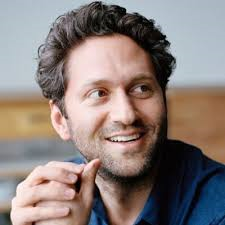April 2018, Year X, no. 4
Kevin F. Adler
The miracle man
“The relationship part is hard and that comes down to the people. We can’t fix that if it’s broken. We have 10% of loved ones that don’t want to connect, but they thank us for doing this. We respect that and there is no judgement”
Telos: There are only two ways to live your life. One is as though nothing is a miracle. The other is as though everything is a miracle”- Albert Einstein said. What is Miracle Messages?
Kevin Adler: Miracle Messages reconnects people living on the streets with their loved ones (and us), through short video message and social media. In 2017, we received funding from Tipping Point for a 1-year pilot in San Francisco. Miracle Messages is a 2017 winner of MassChallenge, and has been featured in the New York Times, NPR, TED, and NowThis, whose video reached 26M views. I started this work in honour of my uncle, Mark, who was the most family-oriented member of my extended family. He was the guest of honour at Thanksgiving and Christmas. He remembered every birthday: the year before he died at the age of 50, he gave me an eagle bandana for my birthday (Adler means eagle in German). Mark also suffered from schizophrenia, and lived on-and-off the streets for 30 years. Those who join our movement contribute to facilitate 1 million reunions by 2023 and help us to show the world that everyone is someone's somebody.
Miracle Messages’ mission is ‘to mobilise the internet to reunite the world. We aim to reunite 1 million homeless people with their loved ones by 2023’. What have you achieved till now?
To date, we have facilitated nearly 100 reunions, with 25% leading to stable housing or living with family again, at a fraction of the cost of current government programs. Moreover, we have achieved 65 million views on our videos, and thousands of volunteers mobilised around the world. Like Mark, there are many people on the streets who suffer from mental illness, or drug addictions, or severe disabilities. Many people who have problems, just like the rest of us. Some are mental illnesses; some are down on their luck, just divorced, missed payment, bad accident, mounting health care costs, debts, mistakes, chances that just didn’t work out. Many people who have families and people who miss them and love them. That’s the reason why I decided to do something about it. I started Miracle Messages to make an immediate and tangible impact in the lives of our neighbours living on-and-off the streets, to build empathy through person-to-person interaction and storytelling, and to use technology for social good.
Anyone who is interested in reuniting with their loved one has the opportunity to record a Miracle Message. We ask questions such as the last time they spoke to their loved one, if they have any way to contact them right now and why they have been out of touch for so long.
We love stories. A successful and an unsuccessful reunion?
Successful: Living on the streets of San Francisco, Timothy had not seen his family in 5 years, and didn't know how to reach them after his mom died. Three caseworkers had tried unsuccessfully to find them. Then, Timothy recorded a short Miracle Messages video at one of our brand-new kiosks, with the help of a virtual volunteer detective named Nancy. In less than one week, Nancy had located his family, written them a handwritten letter, and received a reply: Timothy's family had been looking for him for 5 years! Tonight, Timothy sleeps safely at home with his loved ones once again. Timothy’s story is a miracle, but it’s not unique: 25% of our reunions have led to stable housing or living with family again, and 90% have led to a positive outcome.
And what about Perry’s? Reunited with his son after 19 years. Perry was living on-and-off the streets in Burlington, VT. He recorded a MM to his son, whom he hadn't seen in 18 years since he was 4 years old. Within 24 hours, Perry and his son reunited.
Isaac, reunited with his family after 40 years.
Another success story is that of Jennifer and her brother, Jeffrey, who had been apart for almost 20 years. According to the sister, her brother went from being an unknown individual to suddenly having people check up on him and ask him about his condition and whereabouts. According to Jennifer, her life changed beyond belief when she learned about her brother. Her brother’s video from Miracle Messages was first shared through Facebook and by the next day, two local television channels in her town of Montoursville, Pennsylvania, also picked up the story. Jennifer stated that not everyone in her family was pleased to learn about her brother’s life on the streets. Many were unsupportive. Jennifer told me that “At one point, every single relative was no longer speaking to me because I put ‘our shame’ in the public eye and didn’t make it go away. I was somehow supposed to have taken care of it by keeping it in California where no one knows us.”
From my perspective, there should be a two-step approach to solving homelessness. The first is to assist homeless individuals with safe housing options along with long-term comprehensive medical care. The second is to provide constant social support through relationships. Supportive relationships are even more important than providing housing alone. From the numerous homeless individuals, we have worked with, one important realisation is that family and friends are the key to solving homelessness.
Unsuccessful: we have many messages that have been recorded but not yet delivered. In my view, these are the ones that have been unsuccessful thus far. However, I don’t consider anything to be successful or unsuccessful in those terms. I think there is relational brokenness in our society and we can’t fix that overnight. We can take steps towards healing, but that’s because we’ve created communicational ties. The relationship part is hard and that comes down to the people. We can’t fix that if it’s broken. We have 10% of loved ones that don’t want to connect, but they thank us for doing this. We respect that and there is no judgement.
There is nothing as a free lunch. How does money or revenue fit into this project?
As a non-profit organisation, we rely on individual donors, corporate sponsors, and foundations to financially support this work.
As an example, we had a crowdfunding campaign that was successful in 2105. That money has gone to paying salary costs, program cost and our full-time director Jessica Day, who joined our team in 2016. We are fiscally sponsored by the NetRoots Foundation, so we can accept grants and offer tax-deductible donations.
Marco Sonsini
Editorial
Good news doesn’t make headlines and bad news travels fast. It’s a proven fact. Attempts to create a buzz by only talking about the good and wonderful things that happen have failed miserably. Many have gone into journalism wanting to help change the world, but the lack of editorial interest in concrete solutions to social problems makes it hard to break the cycle of negative news.
Take the problem of homeless people, for instance. Today we’ll show you that there’s another side to these stories of loneliness, poverty and abandonment: examples of positive change, response, transformation. In our own little way, this is our attempt to turn journalism into a positive force. PRIMOPIANOSCALAc takes you to San Francisco, a city teeming with homeless people, where for several years Kevin Adler has been trying to provide people living on the streets with a different future by putting them in touch with their families. And to make our news even ‘better’, he’s doing this using technology, the Internet and social media.
In 2014 Kevin met Jeffrey, on the streets. He listened to his story. Jeffrey, originally from a small town in Pennsylvania called Montoursville with a population of 5,000 people, hadn’t seen his family in over twenty years. A light bulb went off in Kevin’s head: he shot a short video in which Jeffrey sent out a message, a message about his longing to find his family again. Kevin posted this video on the Montoursville community’s Facebook page. In no more than an hour, he managed to locate Jennifer, Jeffrey’s sister. But the miracles don’t stop here: his video was actually shared thousands of times via social media and in just 7 days Jeffrey’s fellow citizens succeeded in raising 5,000 dollars to get him home, after 22 years.
Adler tells us that there are many, complicated reasons that drive people to life on the streets: evictions, mental illness, drug addiction, domestic violence, job loss, medical expenses, the list goes on and on. Yet the awareness that they’ve lost everything doesn’t really hit them until they lose touch with their family members. Adler’s story shows us how with even just a small gesture, we might not be able to change the world, but at least we can change the lives of many people.
Human interaction and kindness, shared trauma and forgiveness are words that come up over and over again in Adler’s stories. After 4 years he’s managed to put hundreds of people, already hopeless and convinced they’d lost everything, back in touch with their families. And he’s done so with great determination while also taking advantage of all the potential offered by modern day interconnected technology. You’ll find out the story behind Adler’s Miracle Messages in his interview for PRIMOPIANOSCALAc. And once again, the timing of this interview couldn’t be better because, over the past few weeks, the press received by social media has been anything but good. Will Miracle Messages be able to work a miracle for them as well?
Mariella Palazzolo

Kevin F. Adler is the Founder and CEO of Miracle Messages, an award-winning nonprofit organisation that reunites the homeless with their loved ones through short video and audio messages, social media, and local volunteers. Kevin is also the author of Natural Disasters as a Catalyst for Social Capital a book that demonstrates the role of shared traumas in bringing communities together or tearing them apart. Previously, Kevin co-founded three organisations in the education space: an online mentoring platform for under-served schools, an online fundraising platform for under-served schools, and an incubator for education technology start-ups.
Adler is a 2017 Emerging Innovator by American Express/Ashoka, a 2016 TED Resident and TED Speaker, and a 2010-11 Rotary Ambassadorial scholar in Mexico. He is also a 2015 New Leaders Council fellow, 2012 StartingBloc fellow, a member of Sandbox, a founding trustee of the Awesome Foundation-San Francisco. He is a regular public speaker, and has given talks at Stanford, UC Berkeley, Occidental, Microsoft, Zappos, and at the Public Affairs Conference and daho.am. He has contributed chapters to three peer-edited volumes, and has written opinion pieces in the New York Times, Christian Science Monitor, TechCrunch, San Francisco Chronicle, and Cedar Rapids Gazette.
Adler has an M.Phil in Sociology from Cambridge University, and a B.A. in Politics from Occidental College, where he was the Culley Award recipient as the top graduating senior and where Roger Boesche, President Barack Obama's "favourite professor" said, "In 40 years of teaching, Kevin is the single best
student I have ever had." Adler is a 2015 graduate of Singularity University’s Global Solutions Program, one of 80 participants selected for the Google-funded summer program at NASA Ames focused on exponential technologies.
He grew up in Livermore, California, and is currently based in San Francisco. He never learned the word stranger and tries to live accordingly. A few titbits about Kevin? He uses his middle initial "F" to honour his mom, Joan Farrington; he was named one of San Francisco's most eligible bachelors, and halas, has never tried coffee.
Marco Sonsini







SocialTelos